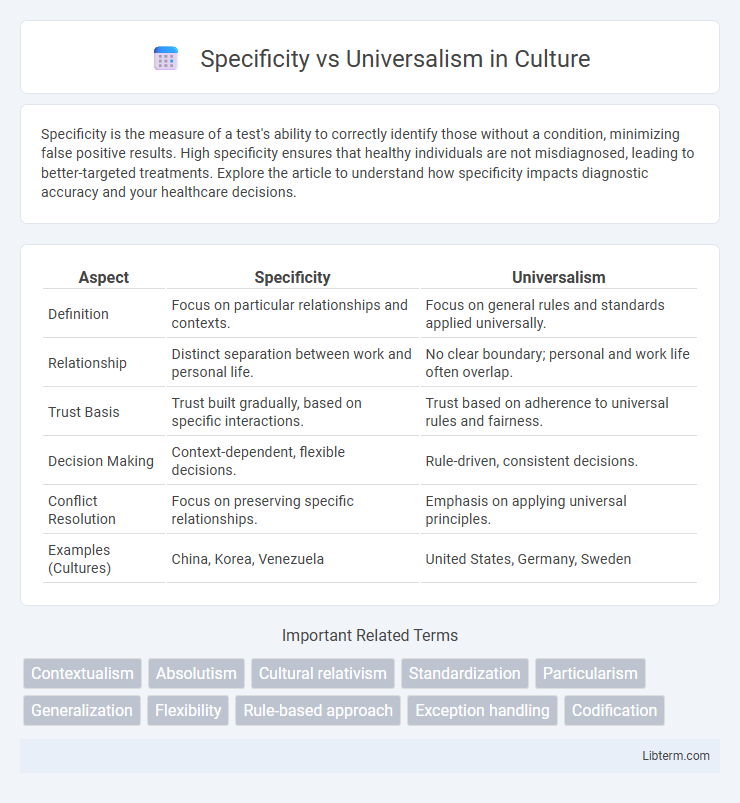Specificity is the measure of a test's ability to correctly identify those without a condition, minimizing false positive results. High specificity ensures that healthy individuals are not misdiagnosed, leading to better-targeted treatments. Explore the article to understand how specificity impacts diagnostic accuracy and your healthcare decisions.
Table of Comparison
| Aspect | Specificity | Universalism |
|---|---|---|
| Definition | Focus on particular relationships and contexts. | Focus on general rules and standards applied universally. |
| Relationship | Distinct separation between work and personal life. | No clear boundary; personal and work life often overlap. |
| Trust Basis | Trust built gradually, based on specific interactions. | Trust based on adherence to universal rules and fairness. |
| Decision Making | Context-dependent, flexible decisions. | Rule-driven, consistent decisions. |
| Conflict Resolution | Focus on preserving specific relationships. | Emphasis on applying universal principles. |
| Examples (Cultures) | China, Korea, Venezuela | United States, Germany, Sweden |
Understanding Specificity and Universalism
Understanding specificity involves recognizing that relationships and social contexts dictate behavior, emphasizing the importance of personal connections in decision-making processes. Universalism highlights adherence to rules and standards that apply broadly, ensuring fairness and consistency regardless of individual circumstances. These contrasting cultural orientations influence workplace dynamics, negotiation styles, and conflict resolution approaches across different societies.
Historical Background of Specificity and Universalism
Specificity and universalism trace their origins to the anthropological studies of Edward T. Hall, who introduced Hall's Context Theory in the mid-20th century, distinguishing high-context (specificity) from low-context (universalism) cultures. Specificity emphasizes particular relationships and situational ethics common in high-context cultures such as Japan and Arab countries, where communication relies heavily on implicit understanding and established social roles. Universalism, prevalent in low-context cultures like the United States and Germany, prioritizes general rules and laws that apply uniformly across contexts, reflecting Enlightenment ideals of universality and rationalism in governance and social interaction.
Core Principles of Specificity
Specificity emphasizes tailored approaches, prioritizing context-dependent norms and particular relationships over abstract rules. It values the uniqueness of individual situations, promoting flexibility and adaptive decision-making based on specific circumstances. This principle contrasts with universalism by rejecting one-size-fits-all solutions in favor of detailed, case-by-case evaluations.
Foundational Aspects of Universalism
Universalism emphasizes applying rules and standards uniformly across all situations and individuals, fostering fairness and predictability in social and legal contexts. It relies on foundational principles such as equality, impartiality, and objectivity to guide decision-making and behavior. By promoting consistent norms, universalism supports social cohesion and the establishment of clear ethical frameworks globally.
Specificity vs Universalism in Policy-Making
Specificity in policy-making emphasizes tailored regulations that address unique local conditions, enabling precise and contextually relevant solutions. Universalism promotes broad, standardized policies designed to ensure consistency and equity across diverse populations and regions. Balancing specificity and universalism is critical for effective governance, as overly specific policies risk fragmentation while overly universal policies may overlook local nuances.
Cultural Influences on Specificity and Universalism
Cultural influences significantly shape the preference for specificity or universalism in social and business interactions, with specificity emphasizing direct, clear communication and universalism focusing on broader principles and generalizations. Societies with high specificity cultures, such as Germany and the United States, prioritize explicit, concrete agreements and clear responsibilities, while universalistic cultures like Sweden and Japan rely on overarching rules and shared values to guide behavior. Understanding these cultural dimensions helps improve cross-cultural communication and collaboration by aligning expectations about precision and context in various interactions.
Application in Education: Specificity vs Universalism
Specificity in education emphasizes tailored teaching methods and curricula that address individual learners' cultural backgrounds and unique needs, enhancing engagement and comprehension. Universalism promotes standardized educational frameworks aiming for equal access and consistent quality across diverse populations, facilitating comparability and broad knowledge dissemination. Balancing specificity and universalism fosters inclusive environments where personalized learning coexists with universally recognized competencies, optimizing education effectiveness.
Economic Implications: Targeted vs Broad Approaches
Specificity in economic policy enables targeted interventions that address particular market failures or demographic needs, often resulting in efficient resource allocation and higher short-term impact. Universalism promotes broad-based economic measures that foster inclusivity and reduce administrative complexity, supporting long-term stability and widespread social welfare. Balancing targeted and universal approaches is crucial for optimizing economic outcomes, with specificity driving precision and universalism ensuring comprehensive coverage.
Ethical Considerations in Balancing Specificity and Universalism
Balancing specificity and universalism in ethics demands careful consideration of cultural contexts and individual circumstances while upholding fundamental human rights. Ethical frameworks must integrate particular social norms without compromising universal principles such as justice, dignity, and equality. This nuanced approach ensures that moral judgments respect diversity yet maintain coherence across different societies.
Future Trends: Navigating Between Specificity and Universalism
Future trends in cultural frameworks highlight a dynamic balance between specificity and universalism, where organizations increasingly tailor strategies to local markets while embracing global standards. Advances in technology and data analytics enable more nuanced understanding of diverse consumer needs, fostering precise yet scalable solutions. Companies that effectively integrate specific cultural insights with universal principles will lead innovation and drive sustainable global growth.
Specificity Infographic

 libterm.com
libterm.com